Best Rust File Access Tools to Buy in February 2026
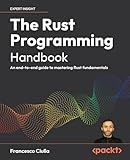
The Rust Programming Handbook: An end-to-end guide to mastering Rust fundamentals


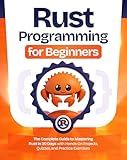
Rust Programming for Beginners: The Complete Guide to Mastering Rust in 30 Days with Hands-On Projects, Quizzes, and Practice Exercises



Rust Hacking for Black Hats: Build Advanced Malware, Network Exploits, and Red Team Tools with Rust Programming


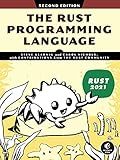
The Rust Programming Language, 2nd Edition


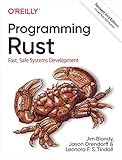
Programming Rust: Fast, Safe Systems Development


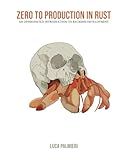
Zero To Production In Rust: An introduction to backend development


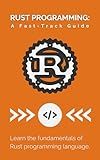
Rust Programming: A Fast-Track Guide: Learn the fundamentals of Rust programming language


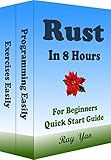
Rust: Rust Programming, In 8 Hours, For Beginners, Learn Coding Fast: Rust Language, Crash Course Textbook & Exercises (Cookbooks in 8 Hours 15)



Rust - Software Programming, Developing and Coding Community T-Shirt
- MAXIMIZE PERFORMANCE WITH MEMORY-EFFICIENT, RUNTIME-FREE RUST.
- BUILD RELIABLE SOFTWARE WITH A FRIENDLY COMPILER AND SMART TOOLS.
- PERFECT FIT FOR PROGRAMMERS NEEDING LIGHTWEIGHT, EFFICIENT SOLUTIONS.


To access files in a directory in Rust, you can use the standard library module std::fs.
First, you need to import this module by adding the line use std::fs; to your code.
To access files in a directory, you typically need to specify the path to the directory. Rust provides multiple ways to specify file paths, including absolute paths starting from the root directory, and relative paths starting from the current working directory.
Once you have the path to the directory, you can use the read_dir function provided by the fs module to get an iterator over the directory entries. It takes the path to the directory as its argument and returns a Result with the iterator or an error if the directory can't be read.
use std::fs;
fn main() { let path = "/path/to/directory"; // Replace with the actual directory path let entries = fs::read_dir(path);
match entries {
Ok(entries) => {
for entry in entries {
if let Ok(entry) = entry {
println!("{:?}", entry.file\_name());
}
}
},
Err(err) => {
println!("Error reading directory: {:?}", err);
},
}
}
Inside the match statement, you can iterate over the entries returned by the iterator using a for loop. Each entry is a DirEntry struct, which provides methods to get information about the entry.
In the example code, entry.file_name() is used to print the name of each file or subdirectory in the directory. You can use other methods of DirEntry to access more information about each entry, such as file metadata or file type.
Remember to replace "/path/to/directory" with the actual path to the directory you want to access.
How to open a file in append mode in Rust?
To open a file in append mode in Rust, you can use the OpenOptions struct from the std::fs module. Here's an example:
use std::fs::OpenOptions; use std::io::prelude::*;
fn main() -> std::io::Result<()> { let file = OpenOptions::new() .write(true) .append(true) .open("path/to/file.txt")?;
let mut file\_writer = std::io::BufWriter::new(file);
file\_writer.write\_all(b"Hello, world!\\n")?;
file\_writer.write\_all(b"This is appended content.")?;
Ok(())
}
In this example, OpenOptions::new() creates a new OpenOptions object with the default settings. The write(true) method configures it to allow writing to the file, and the append(true) method configures it to open the file in append mode.
After that, open("path/to/file.txt")? opens the file in append mode and returns a std::fs::File object. You can then use this object to write data to the file.
In the example, a std::io::BufWriter is used to wrap the file writer for additional performance. You can directly use the File object for writing if you don't require buffering.
Make sure to handle any potential errors that may occur when opening or writing to the file by returning a std::io::Result.
What is the function to get the size of a file in a directory in Rust?
In Rust, you can use the std::fs::metadata function to get the metadata of a file, and then use the len method on the returned Metadata object to get the file size. Here's an example:
use std::fs;
fn main() { let file_path = "/path/to/file.txt"; let metadata = fs::metadata(file_path).expect("Failed to read file metadata"); let file_size = metadata.len(); println!("File size: {} bytes", file_size); }
Make sure to replace /path/to/file.txt with the actual path to the file you want to get the size of. The metadata function returns a Result that contains the file metadata, and the expect method is used to handle any errors that might occur during this operation.
How to open a directory in Rust?
In Rust, you can open a directory using the std::fs::read_dir function. Here's an example:
use std::fs;
fn main() { let directory = "/path/to/directory";
match fs::read\_dir(directory) {
Ok(entries) => {
for entry in entries {
if let Ok(entry) = entry {
println!("Name: {}", entry.file\_name().to\_string\_lossy());
println!("Path: {:?}", entry.path());
}
}
}
Err(err) => {
eprintln!("Error opening directory: {}", err);
}
}
}
In this example, replace "/path/to/directory" with the actual path of the directory you want to open. The read_dir function returns a Result<ReadDir, Error> where ReadDir is an iterator over the directory entries. You can iterate over the entries using a for loop, and use methods like file_name() and path() to get information about each entry.
Note that read_dir returns a std::io::Result, so you need to handle the errors that may occur when opening the directory.
